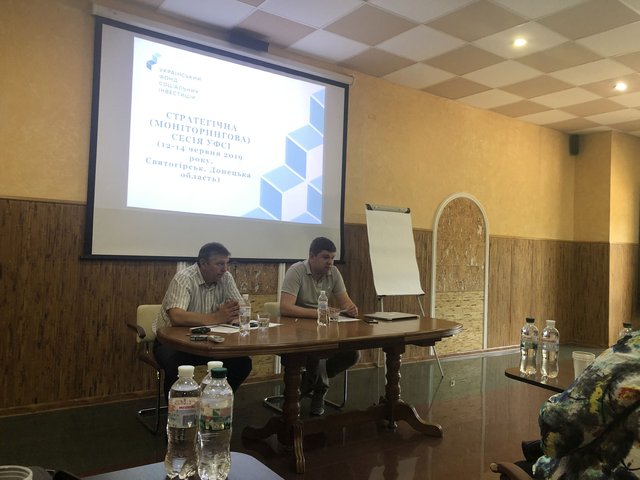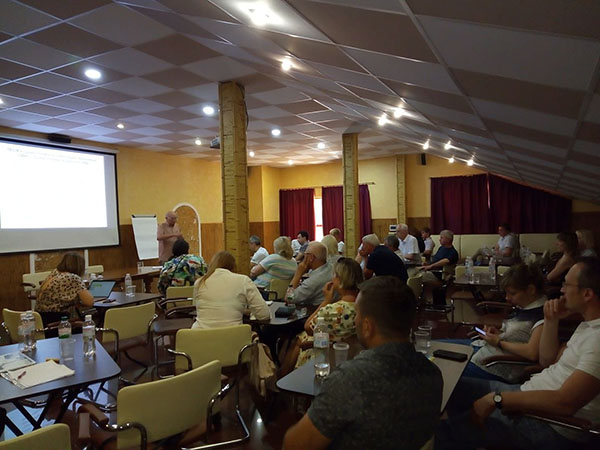Another USIF strategic (monitoring) session has been held

This year strategic (monitoring) session was held on 12-14.06.2019 in of the town of Svyatogirsk, located in the Donetsk region, which had been included in the list of regions of implementation of at least two large-scale USIF projects.
Opening the session, USIF Executive Director Andriy Laktionov, outlined the main range of such issues and briefed the participants on the major inter-sessional events and developments. Significant increase in the projects portfolio, regions of their implementation, establishing effective interaction with the Supervisory Board, representatives of donors, local authorities and communities were mentioned, in particular.
USIF Deputy Executive Director Oleg Ovchinnikov presented a brief analysis of implementation of the strategic recommendations adopted at the previous session (see website). It was emphasized that the majority of them has already been introduced into USIF operation practice. At the same time, concrete measures to improve visibility and strengthen the PR-component of the Fund's activities, were suggested.
Subsequently, USIF Head Office consultants informed session’s participants about taken and planned actions in the sphere of integrity and changes in the provisions of USIF Operational Manual, which regulate procurement issues. In the course of the discussion related to latter question, the decision on feasibility of holding separate specialized internal workshop devoted to procurement rules and procedures was taken.
Directors of USIF regional offices, in turn, shared information on the lessons learned in the course of implementation of phases 1 and 2 of USIF V Project and on accomplished and intended steps within USIF VI Project and Part 3 of ‘Social Safety Nets Modernization’ Project, envisaging renovation of boarding institutions in accordance with plans of their transformation.
USIF Coordinator of «Community-based Social Service Delivery» Project, financed by Japanese Social Development Fund through the World Bank, presented the results achieved to date and scheduled actions to be performed, in particular, in identified implementation areas - Odesa and Ternopil regions.
A need of training for social consultants who have recently joined the Fund, as well as a necessity of enhanced interaction with communities, local authorities, regional and local media were identified while discussing capacity-building issues.
Based on the results of evaluation of USIF Information Management System operation, session participants came to the conclusion that it would be expedient to completely rebuild it with the use of CRM/ERP software.
Considerable attention in the course of the session was paid to the issues of ensuring effective control over the quality and timely execution of renovations and construction works (RCWs) in the framework of subprojects implementation. In this context, the priority character of measures, aimed at improvement of design documentation quality, establishment of more stringent requirements for technical supervision and USIF local technical consultants’ activities and organization of further work in this area on the basis of the new standard bidding documentation, being under reconciliation with KfW, was emphasized.
One of the new important requirements within projects, executed in the framework of cooperation with Germany and the World Bank is evaluation of environmental and social impacts of subprojects implementation. Given the priority of this issue, in the course of the session, an independent external consultant, Mr. Volodymyr Tykhyy, conducted a training on management of implementation of safeguard (preventive) environmental and social measures in accordance with the World Bank policies, requirements of the actual legislation of Ukraine and KfW. Provided information was extremely useful and made it possible for USIF to clearly outline its further actions in this direction.
Summing up the event, USIF Executive Director Andriy Laktionov underlined the necessity to substantially improve Fund’s staff and consultants work in priority operation areas through implementation of concrete measures, a short list of which is provided below.

Measures to improve USIF operation in priority areas
Ensuring positive visibility:
- development and implementation of USIF PR-activities concept;
- effective interaction with media at central, regional and local levels;
- prompt updating of information on USIF website and fakebook page;
- active participation of USIF representatives in the activities carried out by partner organizations, authorities, mass media;
- expansion of the range of hand-outs, print-outs, souvenir products with USIF logo, branding of recently purchased vehicles;
- consideration of a possibility of decoration of the facades of restored buildings in colors of USIF logo;
- improving the quality and ensuring timely execution of RCWs, achieving high performance of capacity development activities.
Partner communities and USIF capacity-building:
- establishing/strengthening comprehensive cooperation with partner communities and authorities;
- development and implementation of efficient communities’ capacity-building plans within implemented subprojects;
- active participation of USIF staff in the activities of Joint Working Groups set up in accordance with concluded Cooperation Memorandums;
- organization of topical trainings and seminars for USIF staff.
Ensuring proper quality of renovation and construction works and their timely execution:
- improving the quality of design and cost estimate documentation through involvement of USIF representatives into its development/adjustment;
- establishing more stringent requirements for the technical supervision and activities of USIF local technical consultants;
- on the basis of the new standard bidding documentation, being currently considered by KfW, introduction of enhanced requirements for development and control over specifications of materials, bills of quantities, plans and schedules of works as important components of construction contracts;
- contract management improvement, including timely application of stipulated sanctions.
Evaluation of environmental and social impact of SPs implementation:
- operational refinement, public discussion and reconciliation of Ecological and Social Management Framework with KfW;
- conducting ecological and social screening, assisting communities in preparation of ecological and social management plans in the form of a checklist (ESMP-CL).
Provision of efficient IT support to USIF operation:
- complete reconstruction of USIF Information Management System (IMS) on the basis of CRM/ERP software;
- establishment and ensuring effective functioning of USIF Working Group aimed to assist in elaboration of the TOR and concept of introduction of such software and its integration with the properly functioning components of USIF IMS.


 +38 (044) 356-65-50
+38 (044) 356-65-50  Phone us
Phone us